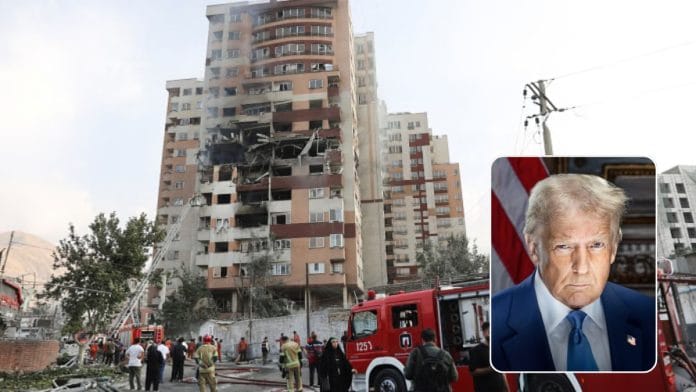New Delhi: US President Donald Trump Friday warned Tehran of more “slaughter”, urging it to make a deal “before nothing is left” after Israel carried out a series of strikes on key nuclear facilities and personnel deep inside the West Asian nation. It killed a number of senior officials, including the chief of staff of the Iranian armed forces.
In a post on Truth Social, Trump said, “I gave Iran chance after chance to make a deal. I told them, in the strongest of words, to ‘just do it,’ but no matter how hard they tried, no matter how close they got, they just couldn’t get it done.”
He further warned that what comes next would be “much worse than anything they know, anticipated, or were told” and that Israel knows how to use the “best and most lethal military equipment”, made by the US.
In a second message, posted on the site an hour later, Trump said, “Two months ago I gave Iran a 60-day ultimatum to ‘make a deal.’ They should have done it! Today is day 61. I told them what to do, but they just couldn’t get there. Now they have, perhaps, a second chance!”
The president was referring to the negotiations between the US and Iran for a new nuclear deal after Trump walked out of the previous agreement—the Joint Comprehensive Plan of Action (JCPOA)—during his first term in power.
The sides had already held five rounds of talks, and, on Thursday, Tehran agreed to a sixth round of negotiations with regards to its nuclear programme for 15 June in Oman’s capital, Muscat. However, shortly after the strikes, Iran cancelled the talks, according to reports.
In the early hours of Friday, Israel launched ‘Operation Rising Lion’, using almost 200 planes to target senior leaders within the Iranian regime and a number of key installations, including the Natanz uranium enrichment facility in Iran.
Iran confirmed that the strikes killed the chief of staff of the Iranian armed forces, Major General Mohammad Bagheri, Commander of the Islamic Revolutionary Guard Corps (IRGC) Major General Hossein Salami, Major General Gholam Ali Rashid, the commander of Iran’s Khatam al-Anbia central headquarters, and two important nuclear scientists—Mohammad Mahdi Tehranchi and Fereydoon Abbasi.
Following the strikes, Iran has said that it reserves the right to respond to Israeli strikes.
Rafael Mariano Grossi, the director general of the International Atomic Energy Agency (IAEA), which has been responsible for monitoring Iran’s nuclear programme, in a statement Friday confirmed that the Natanz facility was impacted, but that there were no “elevated radiation levels”. Natanz is key to Iran’s nuclear infrastructure. In recent years, and as recently as this week, the IAEA has warned of Iran’s rapid accumulation of highly enriched uranium—beyond civilian use and enough to build nuclear weapons.
Grossi further said that, at present, nuclear sites at Isfahan and Fordow were not impacted by the Israeli strikes.
“This development is deeply concerning. I have repeatedly stated that nuclear facilities must never be attacked, regardless of the context or circumstances, as it could harm both people and the environment. Such attacks have serious implications for nuclear safety, security, and safeguards, as well as regional and international peace and security,” Grossi added in the statement.
In his initial post, Trump further said, “Certain Iranian hardliners spoke bravely, but they didn’t know what was about to happen. They are all DEAD now, and it will only get worse… Iran must make a deal, before there is nothing left, and save what was once known as the Iranian Empire.”
He urged Iran to make a deal before it’s “too late”.
Iran has said that in accordance with Article 51 of the United Nations (UN) Charter, it said it has a legitimate right to respond. In a statement, the Iranian Ministry of Foreign Affairs said, “The Zionist [Israel] regime’s acts of aggression against Iran could not have been carried out without the coordination and approval of the United States. Consequently, the US government, as the primary patron of this regime, will also bear responsibility for the dangerous repercussions of the Zionist regime’s reckless actions.”
Shortly after the strikes, US Secretary of State and National Security Adviser (NSA) Marco Rubio distanced Washington, D.C., from the strikes, saying that the military action was done “unilaterally” by Israel. Rubio warned Tehran from retaliating against US interests or personnel in the region.
In 2015, Iran signed the JCPOA with the US, under President Barack Obama, and the other permanent members of the United Nations Security Council—China, Russia, France and the United Kingdom—and the European Union (EU). The deal was for Iran to limit its nuclear programme in exchange for sanctions relief. However, in 2018, Trump pulled out of the deal and reimposed sanctions.
(Edited by Sanya Mathur)
Also Read: Anything that weakens Iran’s proxies is a win for India. Even Israel’s Operation Rising Lion






